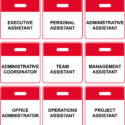
Determining which way to go is not a neat and tidy road, says Kemetia Foley
Over the last three years, I have witnessed the tremendous roller-coaster of career and workplace transitions. Many colleagues have chosen to change career direction, started their own Virtual Assistant company, shifted to a role as a Personal Assistant, decided to semi-retire, or left the administrative career field altogether. These are not simple decisions to make. How does one sort through the myriad of decisions, responsibilities, and vast effort it takes to make changes without losing oneself?
I found myself in that unfamiliar place, trying to determine, do I need a career coach? Do I need a business coach? Do I need a business mentor? What do I truly need versus what do I want? Wow. I sat down, invested a good chunk of time journaling, and got my counselor’s outside professional help to sort through the doubts, questions, and hopes. You see, I suffer from the fatal disease of comparison. I was constantly berating myself for not being as good, busy, or successful as I perceived my colleagues to be. I was in that dangerous neighborhood also known as my mind!
Truly, there is no exact recipe for finding our way, but there are people who can get us to the highway ramp instead of us trying all kinds of roads and operating with no GPS.
Coach or Storyteller?
In May 2020, I went down an internet rabbit hole when I came across a Facebook LIVE of a gentleman from France talking about his coaching business, his books, and his pursuit of helping others become coaches. After following for several months, I reached out to learn more from David Poole (who is now my book editor), to talk about how he defines coaches or coaching. I loved watching his group and his business evolve. I chose to become a part of his ‘Going Beyond the Illusion’ group. The group members were encouraged to write their own stories to support a series of books launched during the pandemic.
During this time, I had frequent conversations back and forth with David as he kept asking me, “What is your coaching business?” I would respond, “David, I am not a coach; I am an instructor.” To this day, he still considers me a coach who has not yet established her own business. Yet his guidance helped me sort through what I did not want to pursue: starting my own coaching business. Our last conversation was illuminating! He said, “Kem, you’re a storyteller first and foremost. You don’t have to be anything else or anything more than who you are. Keep focusing on that.” While many of my colleagues may refer to me as a career coach, I would defer to those actively engaged and educated in that field of work.
Business or personal coaches can be certified, but many are not. The field is full of subject matter experts who deliver guidance and are known by titles such as ‘Life Coach’ or ‘Career Coach,’ and there are those who practice within a specific niche – such as divorce coaching or repairing finances. These coaches select a particular area of problem-solving. Another key trait for a coach is that they traditionally do more listening than speaking. They ask more questions and aim to lead the client to discover their solution.[1] I already knew that I had a tough time doing more listening than talking, so that was out!
Mentoring
Mentoring is a more complicated relationship. One can mentor within their career field or evolve into a de facto mentor through the process of leading by example. Mentoring requires listening, reflecting, demonstrating, and effective communication skills. It employs a teacher-student dynamic. I love this approach to problem-solving. It appeals to me, as I need context when working through a challenge. People prefer concrete examples to help them visualize solutions or to gain perspective.
Mentors approach working with others from a place of servant leadership. While most coaches engage others intending to be of service, they also earn a living by charging for that service. It reflects that their time is a commodity with monetary value; the value of their own time and expertise is placed within a monetary fee structure. Mentors invest a great deal of time and effort, sharing experience and resources to help that person shorten the learning curve. I have a host of unofficial mentors. I have never asked these people to be my mentor directly, but I observe and learn from each one of them.
Consultants
Often confused with coaches, consultants are motivated to define the issue(s). For example, if I were concerned that my appearance (as I am over 50) was a detriment to being hired within an industry that trends younger, such as social media marketing, I would hire a consultant whose specialty is updating appearance. The consultant would pinpoint various issues with my makeup, hair, or wardrobe that age me, then make recommendations on what to change. They may refer you to others for implementing those changes.
Trainers
Trainers are brought in to share expertise on a particular subject to a group. This can range from fitness trainers to new product training for companies. A great example is Vickie Sokol Evans, founder of Red Cape Company, LLC. Her company focuses on master training on Microsoft products and productivity. My friend Freda is a fitness trainer focusing on fitness cycling.
How I Continue to Refine What’s Next for Me
- Let go of an exact timeline and outcome. This doesn’t mean I do not set benchmarks; I leave space to allow them to change.
- Keep a focus on what brings me joy (storytelling) and reinforces a feeling of contributing to the overall good in the universe.
- Be realistic about financials. I currently work full-time. I set specific times in my calendar for item number two above. Acknowledging time and financial constraints means saying ‘No’ to things I would love to fit into my weeks but which would leave me no time for relaxation or family. FOMO (fear of missing out) can be a procrastination tool on steroids. I schedule events directly related to storytelling on my calendar and any writing I can do about storytelling. I may never make a living out of storytelling, and I’m okay with that today.
- Check in with two or three of the most trusted people in my circle about the things I have accomplished as I work towards doing more storytelling.
- Write. It. Out. Write out what I am feeling and what I am perceiving. How am I seeing myself react to my progress?
- Engage a consultant to support a particular area I want to improve this year. I have chosen to work on my website and presentation templates.
Determining where I wanted to go next was not a neat and tidy road. As one of my favorite motivational speakers, Trent Shelton, said, “Progression is an ugly road that leads to a beautiful place. Never let how far you have to go make you forget about who you’re becoming along the journey.”
Taking time alone to hear your own voice and decide what is right for you will help you sort through what kind of guidance you may need on your personal or career travels.
If you should find yourself feeling ambivalent and want to sort through your next move or your next path, I recommend starting with finding alone time or taking a personal retreat. I also recommend getting a copy of the book (hardcopy or digital) You Should Leave Now: Going on Retreat to Find Your Way Back to Yourself by Brie Doyle (2021).
With guidance comes insight and confidence. With clarity comes energy and motivation. Finding the right type of guidance helps us trust the direction we choose.
Resources
1. Mazan, Lori. Comparing Coaching, Training, and Mentoring. Oct. 21, 2021. (https://www.td.org/atd-blog/comparing-coaching-training-and-mentoring)
2. TrentShelton.com, October 2022













